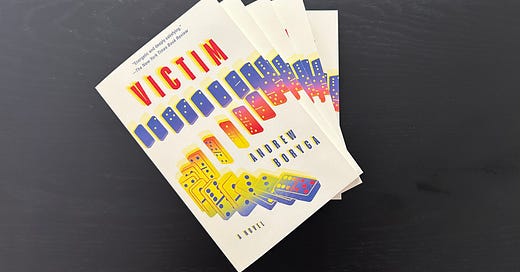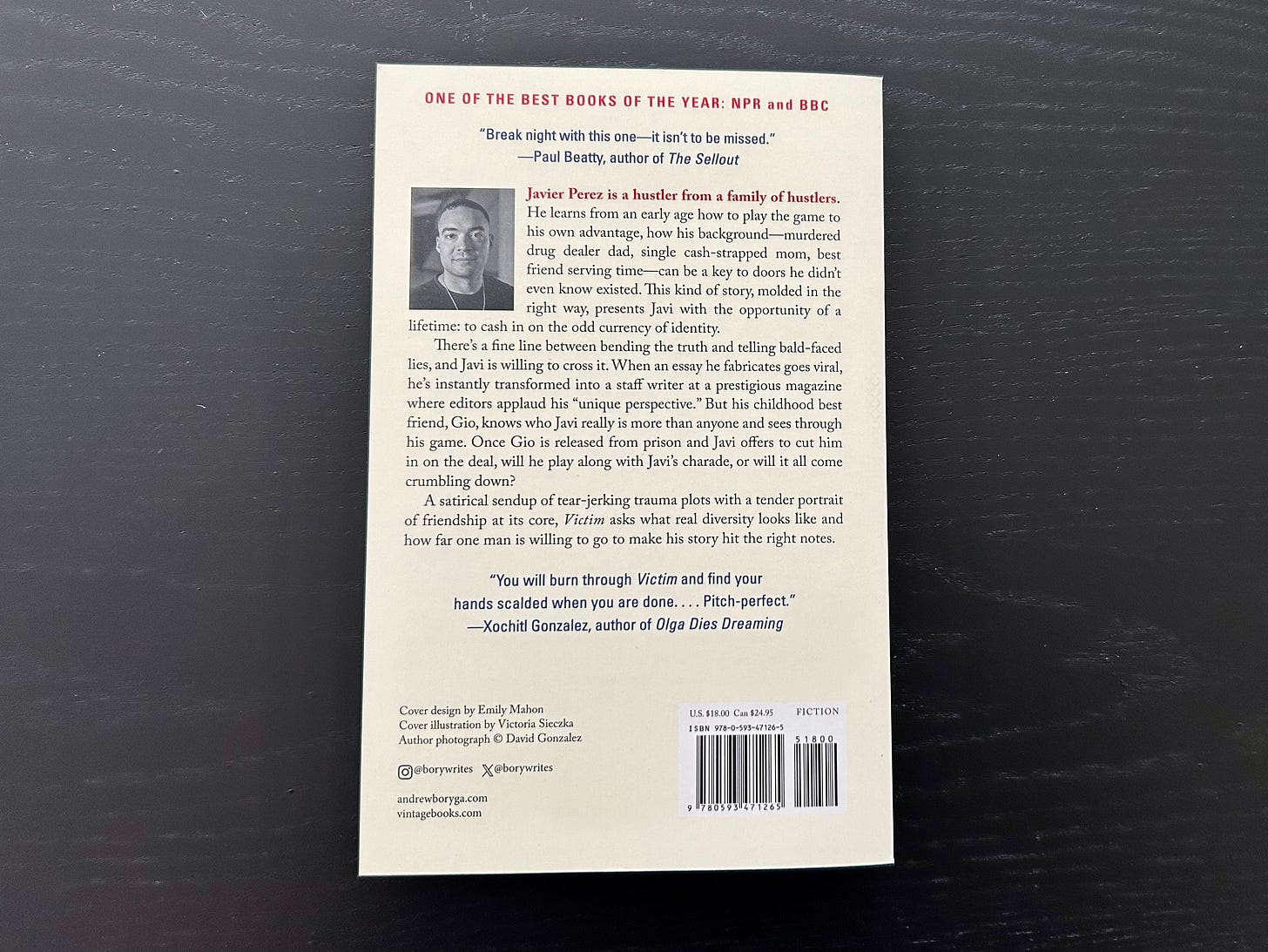They Called My Victimhood Satire ‘Prescient’ Last Year. Now It Feels Prophetic.
Now in paperback, Victim hits even harder in our new "anti-woke" era.
The paperback edition of my debut novel, Victim, hits shelves today. When it was first released a year ago, it entered a culture that was still invested—at least on the surface—in identity politics. A culture that still paid lip service to aspirational diversity, equity, and inclusion goals.
Readers praised its biting humor, authentic voice, and distinct characters. But even fans were unsettled and unsure of its intentions.
They wondered: Is this novel about an enterprising Bronx kid leveraging his cultural cache as a “victim” for personal gain just critiquing how identity and trauma get commodified? Or is it actually a stealth attack on DEI itself? Is this brown guy with liberal bonafides really just rejecting the idea that race and class shape opportunity in America? Is he some MAGA-loving, 4D chess rogue agent who infiltrated the Big 5?
(That last one really brought me joy.)
To tell the truth, the uneasiness around how to digest my book, and the discomfort it prompts in readers, is something I cherish. If I had one real goal while writing Victim, it was to write a novel that wouldn’t be easily digestible.
The novel is many things:
That straight male relationship novel the think pieces keep asking for
A true Bronx novel (what up, Gotham Book Prize!)
A collection of urban, working-class POC characters that feel real (not carefully defanged for white consumption)
A funny novel
And a novel about how our addiction to social media is killing us.
But at its heart—peep the title—it is a satire about how victimhood and identity is packaged, sold, and capitalized on for political and institutional gain. It’s about how racial storytelling in the U.S. often flattens the rich, nuanced experiences of individuals into simple, transactional narratives.
I didn’t write Victim in a fury to jump on some cultural trend; I spent a decade wrestling with it, experiencing setbacks, and taking my time to make sure I got it right.
When the book dropped in early 2024, critics just happened to call it prescient.
The Washington Post described Victim as “A pointed satire of the culture of victimhood.” USA Today said it “pushes the bounds of what true diversity looks like.” NPR praised it as “a charming critique of the publishing industry and its surface-level attempts at righting societal ills.”
The New York Times made it an Editor’s Choice, and the BBC put it among their Best Books of 2024, right up there with my homegirl Sally Rooney (even though ya boy still can’t get a UK edition—go figure).
Although I feared I might get canceled or worse when I was finishing up the book in 2022, when Victim came out, it seemed our nation was ready to have a larger conversation about the cultural shifts around identity over the previous decade that bubbled to the surface in 2020: What was that all about? What did it all mean? How much of it was genuine and useful?
But that was last year.
Today, as the paperback version makes its way into the world in 2025, things are different.
The Trump administration, elected to power partly by running aggressively against DEI and wokeness, has swiftly dismantled diversity programs nationwide and everyone seems to agree we are in our “anti-woke” era now.
The aspirational promises corporations and institutions shouted loudly about a couple years ago have vanished overnight—erased from websites, budgets, and meeting agendas. The diversity hires are getting fired. Universities are prioritizing their endowments over their students.
Remember the ice bucket challenge? DEI goals suddenly feel like that: A viral trend that many pretend they never took seriously. (I hate to say I told you so.)
In this whiplash landscape, I’d argue Victim is even more relevant now precisely because it never picked a side. It isn’t about bashing the left or the right. It isn’t trying to be “woke” or “anti-woke.”
It explores something deeper: How and why identity—in particular the real, messy identities of individuals who rarely get a platform—is constantly co-opted or denounced by powerful interests for profit, politics, or good PR.
In a culture where trends come and go on the daily, it makes the case for people to create opportunities to tell their stories authentically; in a way that reflects the true complexity of their lives, not their [insert identity marker] lives that the “market” craves and that can be praised, denounced, or discarded depending on how the winds blow.
In 2025, I think that message is still pretty damn prescient—perhaps even more so.
So, as the paperback edition of Victim hits shelves today, I invite you not just to read it in its decidedly cheaper and easier to carry form, but to embrace the discomfort you encounter, think through the questions it prompts in you, and, hopefully, start conversations we’ve long been avoiding.
Thank you to those of you who have already read and showed the novel (and me) so much love—it really does mean the world to me. I’m excited for Victim to get a second life—and to meet some new readers who are ready to wrestle with it.
Peace,
Andrew
Endnotes:
Lit Hub recently named Victim one of the best paperbacks to check out this Spring.
If you’re on the fence about the novel, the themes I’m getting at, or me, I encourage you to read this recent interview between myself and the ever insightful Josh Lora of
.If you’re in Miami, you can pick up a signed copy of the paperback edition at a Books & Books location next week. You can also come check me out in conversation with an excellent panel of Miami satirists—including the legendary Dave Barry—on April 24th at 7pm at the Coral Gables location.






My book club recently read Yellowface and I recommended Victim to them as (I think) a nice companion piece, and when I told them a little about it they were all very interested. Not that they are the same book at all, but in my opinion they touch on a lot of the same themes.
you’re going to be on a panel with Dave Barry???